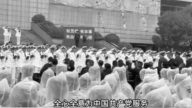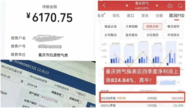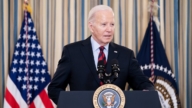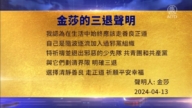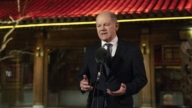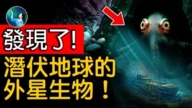【新唐人2012年12月22日讯】中美各自完成在国内政治议程和高层换届后,在美国进行了第一次高层接触。在“第23届中美商贸联委会”会议上,中共高官指责美国对中国企业政治背景审查。那么这种审查,到底是美国政府对中国人或中国企业的不信任,还是另有原因?请看专家分析。
新任的中共副总理王岐山批评美国﹕经常对中国企业进行政治审查,声称﹕即便是“华为”这样的中国私人公司,也在美国遭到“是否与共产党存在联系”的审查。
今年9月,美国总统奥巴马和外资委员会(CFIUS),以威胁国家安全为由,中止中国“三一重工集团”关联企业“罗尔斯(Ralls)”公司,在美国俄勒冈州军事基地附近的风力发电厂项目。美国政府认为,“罗尔斯”公司为“三一集团”两位高管共同所有。
美国“南卡罗莱纳大学艾肯商学院”教授谢田:“中国公司如果到美国投资的话,它可能试图要取得一些美国的国防科技,或涉及到美国的战略利益的话,那政府就会出面审查,以保证这种事情不发生,在中国人来讲是所谓的政治审查,对正常国家来说是非常正常的。”
时政评论家蓝述指出,经济竞争不同于体育竞争,西方国家在和中国企业做生意时,都会考虑中国整个国民经济背后操纵的集权政权,将来会给美国的国家安全及世界和平带来什么样的威胁,同时中共在制定竞争策略时的价值观,也在西方国家的考量范畴。
时政评论家蓝述:“中国和美国今天处在一种战略竞争的关系,而竞争策略制定的基础就是价值观,中共不保护中国工人的劳工权利,故意压低他们的工资,造成美国工作机会的流失,最后劳工权利得不到保证的是中美两个方面的蓝领工人。”
西方社会认为,中国国有企业的首席执行官和高管,由中共中央组织部任免,但中共坚称,这些公司都是独立的商业体,根据商业原则决策,不受执政党或政府的指令。
据“三一集团”官方网页显示,2002年,“三一集团”成立了党委,副董事长向文波担任党委书记。
2003年,中共中央总书记胡锦涛视察“三一”,此后,贾庆林、曾庆红、黄菊、周永康等中共党魁也相继视察“三一”。
北京《国情内参》期刊首席研究员巩胜利告诉《新唐人》,以前民营企业是没有党组织的,现在99%的民营企业甚至外资企业都渗透了党组织。
北京《国情内参》首席研究员 巩胜利:“任何的大型企业都必须设立党组织,党组织在企业往往凌驾于企业之上,这是第一,第二,党组织的人往往是上面派下来的,不是企业本身的,也不通过民主的程序。”
巩胜利反映,中国的国有企业由不同级别的国有资产管理局拥有,共产党直接下命令,而党组织的资本运行从不公开。
巩胜利:“中国的国有企业从组织、从构架、从资本运行,还有它的社会构成,还有它的人员的来源部分都是一种秘密的状态,干什么都由上面来决定的,企业里面的党组织往往是共产党掌握企业的一些秘密。”
另外,王岐山这次演讲,没有像中共历任一样拿着稿子刻板宣读。王岐山说,中共的新任领导有新的规定,讲话不用稿子,正符合他的性格。
蓝述:“中共新上来的这批都是太子党,胆子更加大一点,共产党的这些太子党认为,江山是自己的父辈打下来的,坐江山是应该的,他讲话就比较随便。讲话脱稿只是其中的一个现象而已。”
成立于1983年的“中美商贸联合委员会”,是两国政府在经贸领域最早建立的高级别磋商机制之一,注重解决双边经贸中的具体问题。而美方在这次会议上提出了13项诉求。美国贸易代表柯克19号声称,美方要求中国进一步增强对美国公司的知识产权保护,和打击中国境内的盗版行为,以及保障美国企业在中国的公平竞争。
采访编辑/刘惠 后制/钟元
Wang Qishan Criticizes US for Performing Political Censorship of Chinese Enterprises.
Top Chinese and US leaders have met for the first
time since the two countries’ recent leadership shift.
In the meeting of the “23rd China-US Joint
Commission on Commerce and Trade”, Chinese
senior leaders criticized the US for performing
political censorship upon Chinese enterprises.
What are the reasons for this censorship?
Does the US government not trust China,
or Chinese enterprises, or are there other reasons?
We take a look at the experts’ analysis.
Chinese Vice Premier Wang Qishan criticized
the United States for often performing political
censorship towards Chinese enterprises.
He claimed that, even Chinese private companies like
“Huawei" are also censored, as to “whether it’s connected
with the Chinese Communist Party(CCP)” in the USA.
In September, U.S. President Barack Obama
and the Committee on Foreign Investment
in the United States (CFIUS) stopped the wind
power project of Chinese owned company Ralls.
Ralls is an associated company of Sanyi Enterprise Group.
The wind project was close to a military base in Oregon.
The U.S. government believes that Ralls
belongs to the two executives of Sanyi group.
Professer Xie Tian, School of Business, University
of South Carolina Aiken: " If Chinese companies
invest in USA, maybe it will be censored.
If it tries to get some of America’s national defense
technology, or it relates to the strategic interests
of the US, then the US government will review it.
The aim is to ensure this kind of thing does not to happen.
To the Chinese, it is so-called political censorship,
but it is very normal for a normal country.”
Political commentator Lan Shu pointed out that economic
competition is different from sports competition.
When Western countries do business with Chinese
enterprises, they will take into account the totalitarian
regime that is behind the entire national economy.
They will consider what they will bring to the national
security of the US and to world peace in the future.
Meanwhile, Western countries will also consider
the values of the CCP making a competitive strategy.
Lan Shu, political commentator: “There exists
competition between China and the US.
The basis of competitive strategy is the value.
The CCP does not protect the labor rights of workers,
It deliberately depresses the workers’ wages, resulting in
employment opportunities for US workers being lost.
Eventually, blue-collar workers’ labor rights cannot
be guaranteed between the two countries.”
Western societies think that the CEO and senior executives
of the state-owned enterprises are appointed and removed by the Organization Department of the CCP.
However, the CCP insisted that these companies
are independent commercial entities.
Their decision-making is according to commercial
principles, and aren’t controlled by the Party or government.
According to the official website of Sanyi, in 2002,
Sanyi established a party committee and the
Vice President Xiang Wenbo served as party secretary.
In 2003, Hu Jintao inspected the Sanyi group.
Then, the leaders of the CCP such as
Jia Qinglin, Zeng Qinghong, Huang Ju,
Zhou Yongkang, also did inspections.
Gong Sengli, Chief researcher of “GuoQingNeiCan”
Magazine, told NTD Television that their was no party
organizations in private enterprise in the past.
While now, the party organizations have infiltrated in 99%
of private enterprises, and even foreign-funded enterprises.
Gong Shengli: “Any large enterprise
must set up party organizations.
First, the party organizations are often more
powerful than management in the enterprise.
Second, party organizations are
often decided by superiors.
The choice is not the enterprises,
nor are there democratic procedures.”
Gong Shengli said that state-owned enterprises are owned
by different State-owned Assets Administration Bureau’s.
The CCP directly commands, and the funds
of party organizations have never been public.
Gong Shengli: “The superiors decide the organization
of state-owned enterprises, the architecture and the capital, as well as its social structure.
And its staff’s identities are secret.
What it does is determined by the superiors.
The party organizations often grasp
the secrets of the enterprises.”
In addition, unlike other Chinese leaders,
Wang Qishan didn’t read his speech.
Wang Qishan said that the new leadership of the CCP made
a new rule that they would not use when giving a speech.
It is also in line with his character.
Lan Shu: “The new leaders of the CCP
are princelings, and they are more brave.
These princelings think that the country was seized
by their fathers, and that they should rule the country.
Their speeches are more casual and giving a speech
without a manuscript is just such a phenomenon.”
The China-US Joint Commission on
Commerce and Trade was founded in 1983.
It is one of the earliest high-level consultation organizations
established by the two governments in economics and trade.
It focuses on solving specific biltateral
issues in economics and trade.
At this meeting, the US presented 13 demands.
US Trade Representative Ron Kirk claimed on Dec. 19
that the US asked China to further promote the protection
of intellectual property rights for American companies.
It also asked China to fight against piracy, and to
safeguard fair competition of American business in China.


